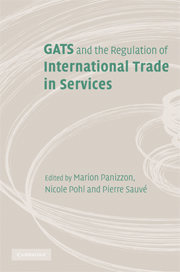Book contents
- Frontmatter
- Contents
- Contributors
- List of figures
- List of tables
- List of abbreviations
- Preface
- PART 1 Beyond regulatory control and multilateral flexibility: Gains from a cosmopolitan GATS
- PART 2 Unexplored economic, political and judicial dimensions of GATS
- PART 3 The limits of request–offer negotiations: Plurilateral and alternative approaches to services liberalisation
- PART 4 GATS case law: A first assessment
- PART 5 Market access, national treatment and domestic regulation
- PART 6 Unfinished business: Safeguard and subsidy disciplines for services
- PART 7 Challenges to the scope of GATS and cosmopolitan governance in services trade
- 22 Trade rules for the digital age
- 23 Comment: Digital trade: Technology versus legislators
- 24 How human rights violations nullify and impair GATS commitments
- 25 Comment: The instrumental rationale for protecting human rights in the context of trade services reform
- 26 In pursuit of the cosmopolitan vocation for trade: GATS and aviation services
- PART 8 Conclusion
- Index
25 - Comment: The instrumental rationale for protecting human rights in the context of trade services reform
from PART 7 - Challenges to the scope of GATS and cosmopolitan governance in services trade
Published online by Cambridge University Press: 03 September 2009
- Frontmatter
- Contents
- Contributors
- List of figures
- List of tables
- List of abbreviations
- Preface
- PART 1 Beyond regulatory control and multilateral flexibility: Gains from a cosmopolitan GATS
- PART 2 Unexplored economic, political and judicial dimensions of GATS
- PART 3 The limits of request–offer negotiations: Plurilateral and alternative approaches to services liberalisation
- PART 4 GATS case law: A first assessment
- PART 5 Market access, national treatment and domestic regulation
- PART 6 Unfinished business: Safeguard and subsidy disciplines for services
- PART 7 Challenges to the scope of GATS and cosmopolitan governance in services trade
- 22 Trade rules for the digital age
- 23 Comment: Digital trade: Technology versus legislators
- 24 How human rights violations nullify and impair GATS commitments
- 25 Comment: The instrumental rationale for protecting human rights in the context of trade services reform
- 26 In pursuit of the cosmopolitan vocation for trade: GATS and aviation services
- PART 8 Conclusion
- Index
Summary
Marion Panizzon's chapter presents a ‘new perspective’ on the human rights and trade debate through a consideration of the potential effects of human rights violations on GATS commitments. The article focuses in particular on commitments made by WTO Member States to liberalise the temporary movement of natural persons under GATS, mode 4. The chapter argues that violations of human rights in the country receiving migrant workers might nullify or impair the sending country's legitimate expectations of commercial benefit arising from WTO commitments. Where that is the case, the chapter proposes that the WTO sending countries could bring claims against the receiving country to the WTO dispute settlement mechanism. Those claims could relate either to violations or non-violations of WTO law. Amongst other things, the chapter suggests that the WTO should consider the economic effects of human rights violations on trade commitments, while refraining from considering the altruistic reasons for protecting human rights, the latter being the domain of other intergovernmental organisations.
Marion Panizzon's focus on the economic effects of human rights violations is significant. It is an important reminder of the instrumental value of human rights – that respect for human rights can benefit trade and, conversely, that a failure to promote and protect human rights can have negative consequences for trade.
- Type
- Chapter
- Information
- GATS and the Regulation of International Trade in ServicesWorld Trade Forum, pp. 561 - 565Publisher: Cambridge University PressPrint publication year: 2008



